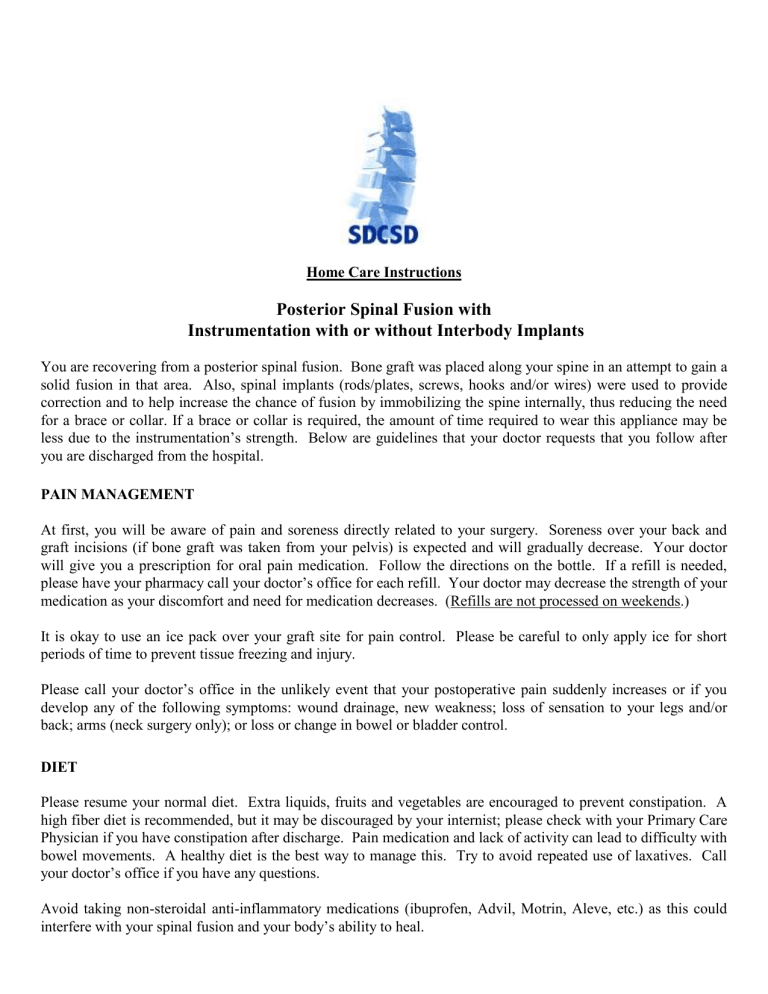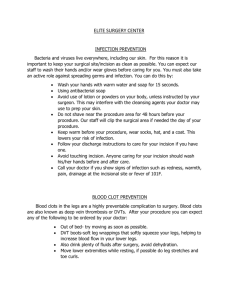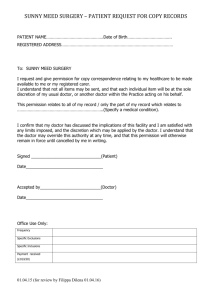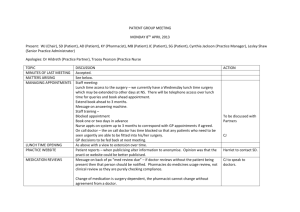home care instructions for

Home Care Instructions
Posterior Spinal Fusion with
Instrumentation with or without Interbody Implants
You are recovering from a posterior spinal fusion. Bone graft was placed along your spine in an attempt to gain a solid fusion in that area. Also, spinal implants (rods/plates, screws, hooks and/or wires) were used to provide correction and to help increase the chance of fusion by immobilizing the spine internally, thus reducing the need for a brace or collar. If a brace or collar is required, the amount of time required to wear this appliance may be less due to the instrumentation’s strength. Below are guidelines that your doctor requests that you follow after you are discharged from the hospital.
PAIN MANAGEMENT
At first, you will be aware of pain and soreness directly related to your surgery. Soreness over your back and graft incisions (if bone graft was taken from your pelvis) is expected and will gradually decrease. Your doctor will give you a prescription for oral pain medication. Follow the directions on the bottle. If a refill is needed, please have your pharmacy call your doctor’s office for each refill. Your doctor may decrease the strength of your medication as your discomfort and need for medication decreases. (Refills are not processed on weekends.)
It is okay to use an ice pack over your graft site for pain control. Please be careful to only apply ice for short periods of time to prevent tissue freezing and injury.
Please call your doctor’s office in the unlikely event that your postoperative pain suddenly increases or if you develop any of the following symptoms: wound drainage, new weakness; loss of sensation to your legs and/or back; arms (neck surgery only); or loss or change in bowel or bladder control.
DIET
Please resume your normal diet. Extra liquids, fruits and vegetables are encouraged to prevent constipation. A high fiber diet is recommended, but it may be discouraged by your internist; please check with your Primary Care
Physician if you have constipation after discharge. Pain medication and lack of activity can lead to difficulty with bowel movements. A healthy diet is the best way to manage this. Try to avoid repeated use of laxatives. Call your doctor’s office if you have any questions.
Avoid taking non-steroidal anti-inflammatory medications (ibuprofen, Advil, Motrin, Aleve, etc.) as this could interfere with your spinal fusion and your body’s ability to heal.
INFECTION
Infection is not expected after surgery, but it can occur. It is important for you to look at your incision(s) every day until your first office visit. The incision(s) should look pink and the edges should be together. If you have had back surgery before, special suture or skin staples may have been used to close the skin layer. These need to be removed in the doctor’s office approximately 10 days after your surgery and a special appointment should be made for you at the time of discharge. Continue sponge bathing for 7-10 days after surgery. Please ask your doctor when you can begin showering before discharge. AVOID TUB BATHS, WHIRLPOOLS, JACUZZI’S,
SWIMMING POOLS, ETC. more one month after surgery, unless otherwise instructed by your surgeon.
Some swelling around the incision(s) or drain site can be normal. Fluid can accumulate under the skin, which can be bothersome. This area of swelling should be watched daily. Over time, it should slowly decrease. If the swelling worsens, or if the incision begins to drain, please call your doctor’s office. Also call if the incision becomes “angry looking”, such as: very red, swollen and hot to the touch or if a fever greater than 101.0 by mouth occurs. This may be a sign of infection and may need to be evaluated and treated. If you need to call after office hours or on the weekend, your doctor’s answering service will provide instructions on how to reach your doctor or his associate on call.
ACTIVITY
At first, you will limit yourself due to stiffness and soreness. After the first several weeks, however, you will become more active. Therefore, you should be aware of the following to prevent injury and to assist with the fusion healing process.
1) Avoid twisting, bending forward from the waist or heavy lifting. Bending at the hips and knees into a hiphinge position is acceptable as long as your back remains straight. Your doctor will instruct you on the amount of weight you may lift initially as well as later on.
1a) If your surgery is located at the cervical spine, please avoid neck extension (looking up or arching the neck) and overhead lifting until your doctor releases you from this restriction.
2) Walking, stair climbing, riding as a passenger in a car or taking public transportation is permitted in most cases. Driving is usually allowed after the first office visit with your doctor (approximately one-month after surgery). If you are taking much less pain medication and can function, call your doctor about driving sooner than one month after surgery.
3) RETURN TO WORK: This will vary for each patient. Your doctor will make this decision based on the reason for surgery, the outcome of the surgery; the type and length of work required, etc. Return to work during the fusion healing period will only be allowed if the patient can return with restrictions (generally no lifting greater than 10-15 pounds and no repetitive bending or twisting from the waist). Check with your employer about returning to work with these restrictions.
SCAR CARE
Exposure of a healing incision to sunlight or tanning beds can be potentially harmful and bad sunburn may occur.
It is recommended to apply a sun block over the incision during the first year unless otherwise advised by a doctor.
BRACE/COLLAR TREATMENT
Brace/collar treatment after surgery may be required. Your brace will be made of a lightweight, rigid plastic, which is fitted, to your body’s contours. A Certified Orthotist will mold or measure and adjust your brace in the hospital to ensure comfort after discharge. Your brace should be worn at all times, except when sleeping or showering, unless instructed differently by your doctor. If a collar is required, you will be fitted prior to your discharge. Skin care will be the same for both.
A soft cotton undershirt should be worn under the brace to prevent pinching, rubbing or excessive perspiration.
Rubbing alcohol should be applied to your skin anywhere the brace is in contact with your body. This helps to keep the skin dry. Lotions and powders should not be used in this area as these products may cause increased moisture and skin breakdown.
After discharge, if further adjustments are required, please call your Orthotist for an appointment.
DENTAL PRECAUTIONS
Your dentist and/or oral surgeon should be aware that a metal spine implant system has been implanted prior to any dental cleaning or work. Please have your dentist call our office for a copy of our protocol for antibiotic therapy after spinal fusion surgery.
FOLLOW-UP
Follow-up is very important after a posterior spinal fusion. Your cooperation in returning to see your doctor at the listed times is appreciated. Your surgeon will need to examine you and take x-rays each time you return to see him. This will allow him to determine if your spinal fusion is progressing and observe for any potential problems. The doctor will be able to update you on your activity allowances at each office visit. The follow-up schedule is as follows: one month after surgery, followed by appointments 3,6, 12 and 24 months after surgery.
This may vary based on your individual needs. If a problem occurs, please call your doctor’s office to determine if an office appointment is necessary. If you have insurance that requires a referral, please remember to obtain one for each office visit after your surgery .
This instruction sheet has been written to give you useful information following a posterior/interbody spinal fusion. This is not a substitute for or in place of your doctor’s instructions. If you have been advised differently based on your individual needs, please follow your doctor’s recommendations. If you have any questions, please call your doctor’s office.
Patricia Kostial, R.N., B.S.N.
Clinical Nurse Coordinator
SAN DIEGO CENTER FOR SPINAL DISORDERS
4130 La Jolla Village Dr.; Suite 300
La Jolla, CA 92037
(858) 678-0610 / (858) 678-0007 fax
Revised 6/9/2003 pk







